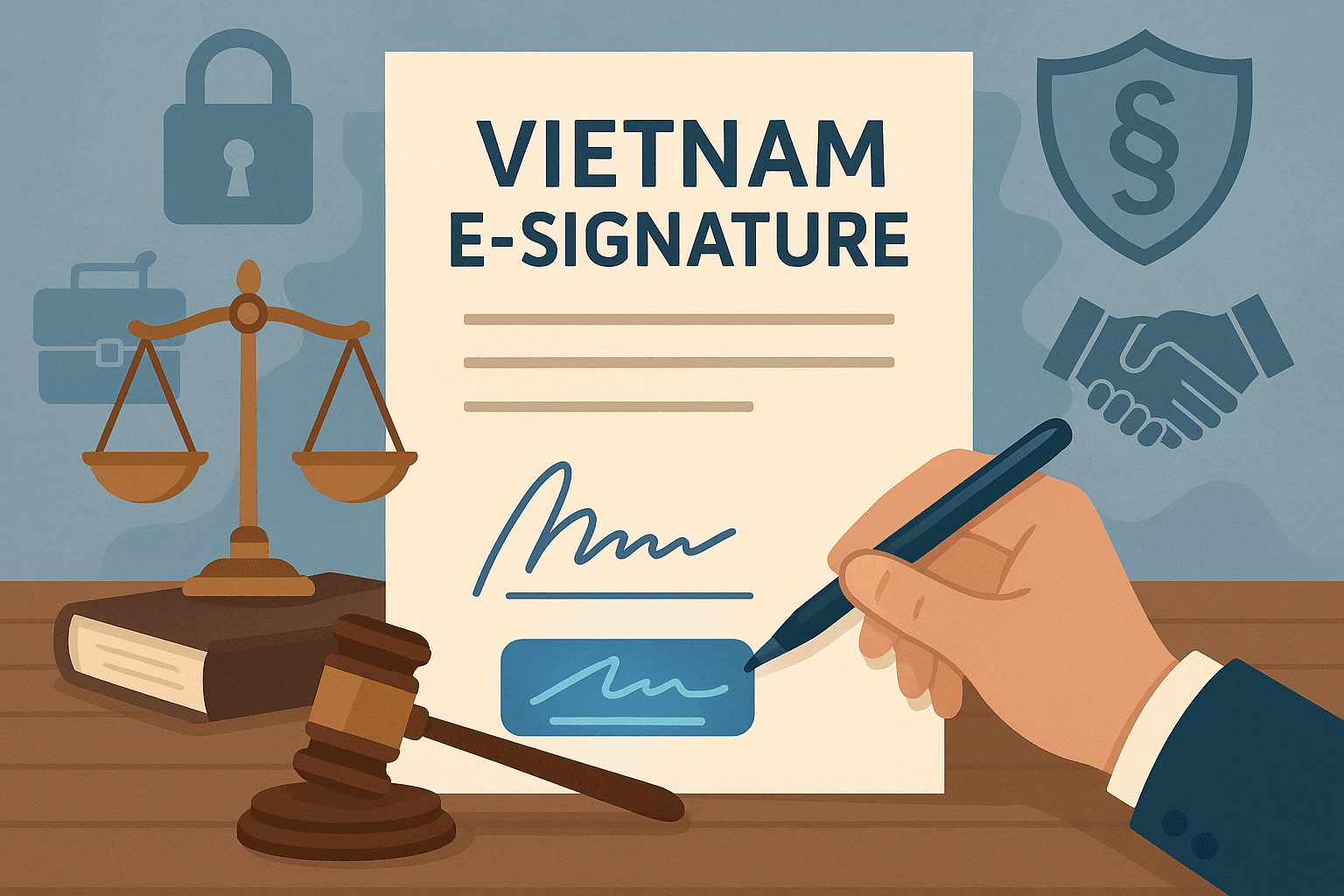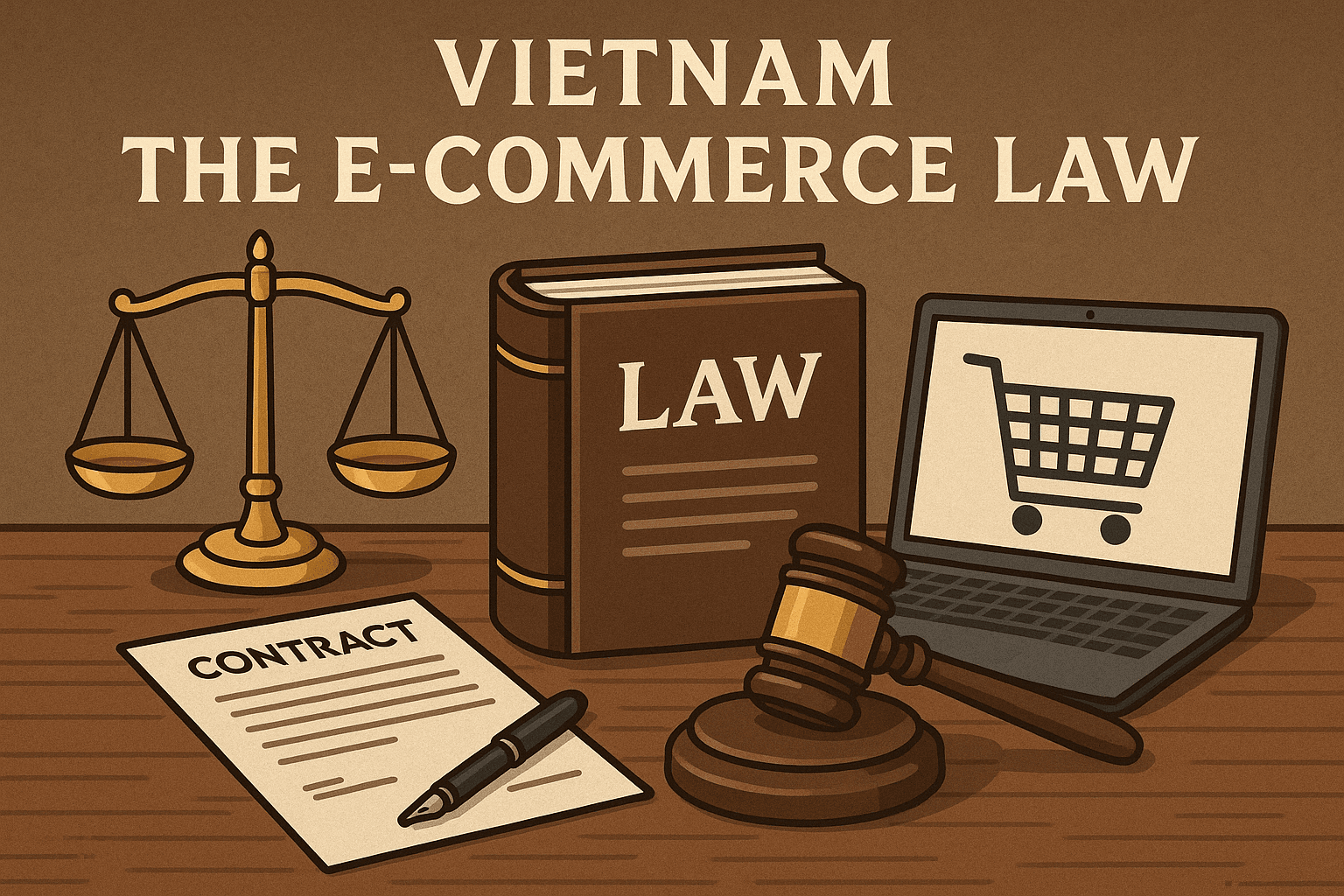WhatsApp or email with our sales team or get in touch with a business development professional in your region.
Choosing the Best Digital Signature Tools in Vietnam 2025





In Southeast Asia’s accelerating digital landscape, electronic signature (e-signature) platforms are no longer considered luxury tools — they’ve become a regulatory necessity and a competitive differentiator. As businesses across Vietnam, Thailand, and the broader ASEAN region undergo digital transformation, the pressure to digitize contracts and secure document workflows has intensified. Not only must organizations ensure transactional speed, but they must also stay compliant with evolving local laws, such as Vietnam’s recently enacted E-Commerce Law (No.20/2023/QH15) and existing provisions like Decree No.130/2018/ND-CP which govern the use of digital signatures.

A growing number of enterprises are seeking trusted e-signature solutions that are not just feature-rich, but also tuned to local compliance frameworks. At the intersection of legal accountability, document security, and operational efficiency, the adoption of e-signatures has moved from “nice-to-have” to “mission-critical.”
Understanding E-Signature vs. Digital Signature in Regulatory Terms
It’s important to distinguish between electronic signatures (e-signatures) and digital signatures from both a technical and legal perspective. An “electronic signature” refers broadly to any electronic mark intending to capture consent or approval in digital documents. However, a digital signature — defined and governed tightly under frameworks like the ET Act and Decree No.130 — employs cryptographic techniques like Public Key Infrastructure (PKI) and is certified by a licensed Certificate Authority (CA).
Digital signatures offer verifiable security through identity authentication and document integrity. Vietnam’s Decree No.130/2018/ND-CP explicitly outlines the conditions under which digital signatures are recognized as legally binding, requiring licensed CA certification, timestamping mechanisms, and data encryption. These provisions are in harmony with international PKI standards yet tailored to protect Vietnamese entities from fraud and data tampering in digital transactions.

Southeast Asia’s E-Signature Market: Momentum Toward 2025
According to data from MarketsandMarkets, the global e-signature market is projected to reach $25.2 billion by 2025, growing at a CAGR of 27.1%. In the Asia-Pacific region, growth is even more remarkable, with Southeast Asian markets—such as Vietnam, Indonesia, and the Philippines—becoming new contenders. Local infrastructure digitization, increasing legal clarity regarding e-transactions, and post-COVID hybrid work models are fueling adoption.
Gartner’s recent forecast specifically recognizes Southeast Asia as “an emergent focus zone” for e-signature providers, as enterprises seek platforms that balance international-grade encryption with regional legal conformity.
Technological Drivers and Compliance Considerations
At the technological core, modern e-signature solutions integrate algorithmic hashing, PKI-based encryption, multi-factor authentication (MFA), and CA-issued digital certificates. For Vietnamese entities, compliance with the ET Act (Article 28 and 29) and Decree No.130 determines the legal usability of signatures — especially in contracts involving state agencies or cross-border e-commerce.
Signatures must safeguard document content, ensure identity traceability, and be time-validated to qualify under the terms of secure digital messages. This has led to a bifurcation in the market: general e-signatures for convenience-oriented documents and certified digital signatures for high-risk agreements such as financial contracts or audits.
Top E-Signature Providers Dominating the Asian Market in 2025
1. eSignGlobal — The Asian Digital Signature Innovator
Leading the regional innovation curve is eSignGlobal, the first Asian e-signature provider to rank in the global top 10 per MarketsandMarkets 2025. Positioned as a compelling alternative to giants like DocuSign and Adobe Sign, eSignGlobal seamlessly integrates local compliance, offering native support for Vietnamese and other ASEAN-region legislation.
As one Vietnamese logistics SME reports, switching to eSignGlobal cut their contract approval times by 40% while ensuring every signature met the Decree No.130 requirements with integrated CA-issued certificates. In addition, the platform provides SLA-backed onboarding services, Vietnamese UI/UX, and local datacenter support — a standout for governmental and banking clients in Hanoi and Ho Chi Minh City.

2. DocuSign — Global Leader with Strong Enterprise Features
Known for its robust integrations and global ecosystem, DocuSign offers best-in-class workflow logic, legal enforceability across jurisdictions, and reliability in large enterprise contexts. However, it may require additional customization to align with Vietnam’s local legal stipulations, especially under the new 2023 ET Act and the existing Decree No.130 regarding digital certificate authorities.

3. Adobe Sign — Integrated Ecosystem with Microsoft and PDF Workflows
Adobe Sign remains a top-tier option, particularly where deep PDF or Microsoft ecosystem integrations are mission-critical. For creative and document-heavy industries, Adobe’s brand strength and security protocols meet enterprise-grade security specifications. Still, it remains oriented toward Western compliance needs, often requiring region-specific add-ons or legal reviews for Vietnamese deployments.

4. Dropbox Sign (formerly HelloSign)
Dropbox Sign focuses on simplicity, rapid deployment, and small-business customization. Its appeal lies in its cost efficiency, but it lacks out-of-box support for digital signatures recognized under Decree No.130, making it more suitable for low-risk or internal-use documentation.
5. PandaDoc
With a strong emphasis on sales documents, proposals, and quoting, PandaDoc is a favorite among startups and SaaS companies. While its e-signature engine is lightweight and intuitive, PandaDoc does not yet offer native CA integration for Vietnam, placing it outside the digital signature compliance category.
6. SignNow
A budget-friendly option gaining traction among SMEs in Southeast Asia. SignNow blends competitive pricing with enterprise features but offers limited legal localization. Ideal for document workflows with minimal regulatory complexity.
7. Zoho Sign
Zoho Sign integrates tightly with the broader Zoho SaaS suite, which is widely used in Indian and Southeast Asian SMEs. It supports Aadhaar eKYC and other regional standards but requires modifications or legal overlays for full Vietnamese digital signature conformance.
Comparative Considerations Based on Use Case
When selecting an e-signature provider, organizations must clearly delineate between document types — is the signature for a procurement contract, an HR on-boarding form, or a cross-border financial agreement?
- eSignGlobal and DocuSign are ideal for banks, public-sector entities, or MNCs needing legally binding, regulation-compliant, digitally certified workflows.
- Adobe Sign stands out where high-volume document workflows and legacy system integration matter.
- Dropbox Sign and SignNow are optimal for startups and SMEs with budgetary sensitivity and lower legal exposure.
- Zoho Sign fits export-oriented businesses already on the Zoho stack, though legal fit in Vietnam still needs validation for high-stakes contracts.
Pricing often maps closely to functionality: subscription tiers range from $8/user/month for lightweight platforms to $30–$50/user/month for enterprise-grade with audit trails, API access, and legal certification.
Adoption Patterns Across Business Sizes
A typical small business in Hanoi may lean toward Dropbox Sign or SignNow for usability, only shifting toward eSignGlobal when pursuing government contracts requiring certified CAs. Mid-sized firms, especially those in distribution or fintech, increasingly prefer eSignGlobal due to its compliance-first design and regional SLA support.
Multinational corporations and banks, on the other hand, deploy hybrid models: DocuSign globally, supplemented by regional solutions like eSignGlobal in Vietnam to meet local legal obligations. In one instance, a Japanese-Vietnamese joint venture in Da Nang used Adobe Sign for internal processes while routing formal agreements via eSignGlobal due to its Vietnamese CA alignment.
As regulatory scrutiny intensifies into 2025, businesses will need more than a sleek UI—they’ll need demonstrable legal backing for every signature executed.
Overall, the Asian e-signature ecosystem has shifted from generic toolsets to locally nuanced, regulation-aligned platforms. As the Vietnamese enterprise market matures, choosing solutions that ensure both operational agility and legal defensibility will be paramount.

Shunfang
Head of Product Management at eSignGlobal, a seasoned leader with extensive international experience in the e-signature industry.
Follow me on LinkedIn
Get legally-binding eSignatures now!
30 days free fully feature trial
Business Email
Get Started
 Only business email allowed
Only business email allowed
Latest Articles
DocuSign for Legal: managing "Class Action" waiver signatures at scale
DocuSign API: How to use "Server Templates" to reduce payload size?
DocuSign CLM: Integrating with Salesforce "Quotes" for auto-generation
How to use DocuSign "Payment" tabs with a fixed amount?
DocuSign vs. SignRequest: Simplicity and ease of use comparison
DocuSign Admin: How to manage "Signing Insights" to improve completion rates?
DocuSign API: How to create a "Clickwrap" agreement via API?
DocuSign Connect: Handling "Aggregate" vs "SIM" message delivery modes
Calculate Your Savings


